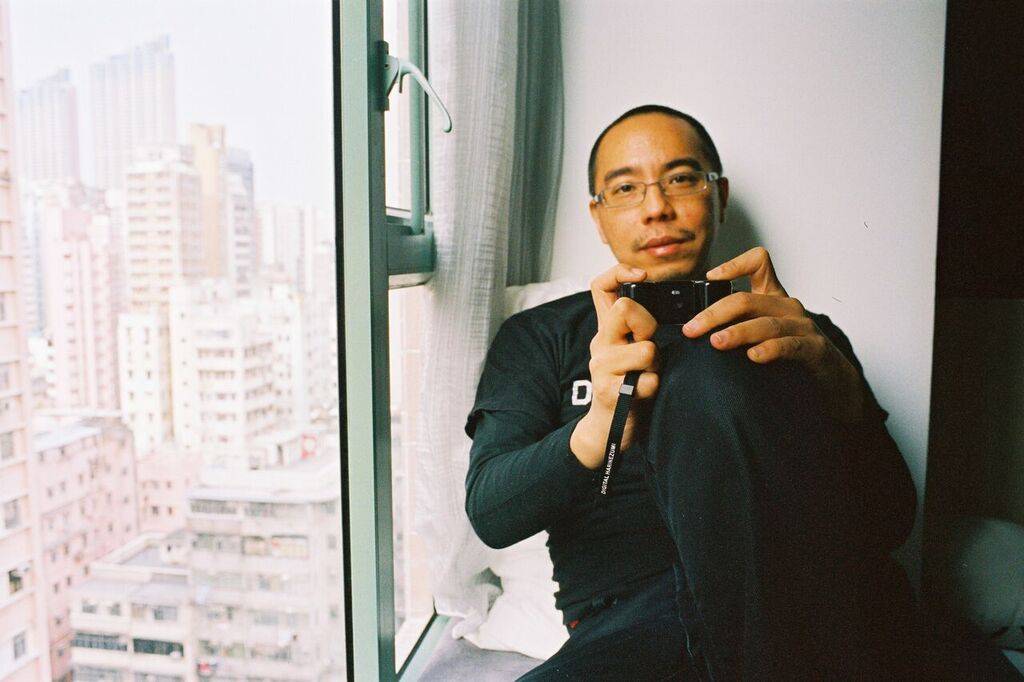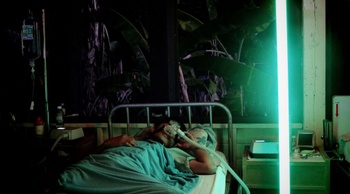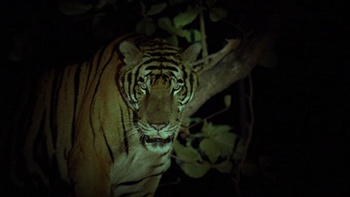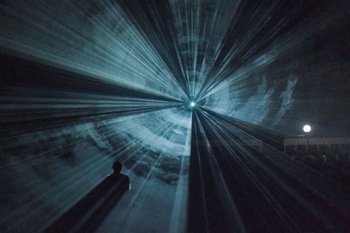A conversation with Palme d’Or winner Apichatpong Weerasethakul. The Thai filmmaker and artist is guest of honour at the KFDA with his theatre debut, and a very special open air screening amongst the trees. A retrospective of his films is currently on at Cinema Galeries. And he has filled their subterranean exhibition space with his video work.

© Apichatpong Weerasethakul/Kick The Machine
Apichatpong Weerasethakul at KFDA
'It’s a very nice location to show my work, but also very challenging. It’s very narrow and tunnel-like. That’s quite a restriction when you are working with lights and projectors. But I think we managed to present something beautiful in the end.'
'It’s a secret place, hidden underground, so the works need to be very intimate. The result is something really private, full of quiet little moments.'
That’s exactly what the exhibition feels like: intimate and very personal.
'Yes, absolutely. It features my first video, my first 16mm film, also my partner, my dogs, my friends.'
'The last piece is of my father in his bed, when he’s doing a kidney dialysis. He’s having to do that these last years of his life. I also used that image for my movie ‘Uncle Boonmee’, which shows people having a kidney dialysis.'

© Apichatpong Weerasethakul/Kick The Machine
Why is your work filled with disease? You choose titles like ‘Tropical Malady’ or ‘Fever Room’. People with a limp or other physical defect wander through your pieces. And your most recent movie was about a hospital, filled with soldiers suffering from a mysterious sleeping disease.
'Because it was my world. I grew up in a hospital area. Both my parents were doctors. We lived in this medical compound, and the hospital was my playground. So I’m used to the rhythm, to the sickness.'
'I want to bring attention to different kind of maladies as something normal. Sometimes people tend to think that being sick is not normal, that it’s a problem. We go to the doctor when there is a problem. But the doctor should say: no, you are normal. If you don’t get sick, then you have a problem.'
'We are supposed to get sick, to die. If we embrace that it can be something liberating, and reduce a lot of tension and fear.'
Your very first work is shown here. What do you think of it, looking back?
'I think it’s pretty good! (laughs) It shows that I was really sensitive to light, and to camera movement. It’s totally abstract.'
'Gradually of course I brought in more narrative, from my country, from my own life. So I moved away from that experimentation.'
'Now I feel there are so many stories in life. And I’ve replaced the cinematic tricks of my early days for very simple beauty.'
You’ve said before that ‘Cemetery of Splendour’ might be the last feature you made in Thailand, because of the political instability there. Has anything changed?
'I will still make a lot of short movies in Thailand. It’s where I live. I’m building a studio there, I’m planning workshops.'
'But making a feature film demands a lot of finance, effort and planning. It’s become quite difficult on a bureaucratic level. We don’t have a proper government yet. And there is also the issue of censorship.'
'I definitely want to do a new feature, but if the situation doesn’t approve in Thailand I will make it elsewhere. But I think that to do something outside Thailand might be a good reflection back on the home country. And I’m also curious to see how different landscapes would affect my filmmaking.'

© Apichatpong Weerasethakul/Kick The Machine
Your film ‘Tropical Malady’ will get a very special screening at the festival: in the middle of the Forêt de Soignes.
'Yes, I’m very excited about it. It’s taking my work into a different context. It will give the audience – and myself – the opportunity to see it differently. And the animals. I hope there will be some animals there, watching. Are there animals in the woods?'
Sure, but I think the people will scare them away
'OK. Well maybe some insects at least. I’m hoping for some insects!'
The festival will also show ‘Fever Room’. Your first theatre show. Or performance. Or maybe we shouldn’t try to label it?
'Oh please label it: it’s cinema. Maybe ‘expanded cinema’. But it’s still cinema.'
'In cinema you have a light shining on a screen. Here it will also be shining on you, and on different screens. It’s a very simple piece. It’s quite naïve.'
'I approach the theatre world in a very cautious and minimal way. So that it remains something I can control and feel comfortable with.'
'But I really hope the people will move around. When we first showed it in Gwangju, people just remained in their seats. They didn’t want to move around and maybe block other people’s views.'
'So I hope people will wander around in Brussels, at least for part of the performance. You have to. Otherwise your butt will hurt!'

© Apichatpong Weerasethakul/Kick The Machine
The retrospective of his movies and the exhibition 'Memorandum' run until 29/05 at Cinema Galeries.
'Fever Room' is on at the KVS from 21/05 until 25/05.
The special screening of 'Tropical Malady' in the Forêt de Soignes/Zoniënwoud is on 16/05.
Apichatpong Weerasethakul will give a master class on 19/05.
More information here.
Read more about: Podium , Events & Festivals , Expo , Film , Kunstenfestivaldesarts 2016
_Amir Hossein Shojaei.jpg?style=W3sianBlZyI6eyJxdWFsaXR5Ijo3NX19LHsicmVzaXplIjp7ImZpdCI6ImNvdmVyIiwid2lkdGgiOjM2MCwiaGVpZ2h0IjoyNzAsImdyYXZpdHkiOiJjZW50ZXIiLCJ3aXRob3V0RW5sYXJnZW1lbnQiOnRydWV9fV0=&sign=fa60ffc348b662f497e270741ec3a23cada23e6b85bae7889a63fbd6f811569e)

_Saskia Vanderstichele.jpg?style=W3sianBlZyI6eyJxdWFsaXR5Ijo3NX19LHsicmVzaXplIjp7ImZpdCI6ImNvdmVyIiwid2lkdGgiOjM2MCwiaGVpZ2h0IjoyNzAsImdyYXZpdHkiOiJjZW50ZXIiLCJ3aXRob3V0RW5sYXJnZW1lbnQiOnRydWV9fV0=&sign=09155780bc111a42b97317fc1306ce63e62aca2d6a56d05ff9e3e3ea82eed044)

Fijn dat je wil reageren. Wie reageert, gaat akkoord met onze huisregels. Hoe reageren via Disqus? Een woordje uitleg.